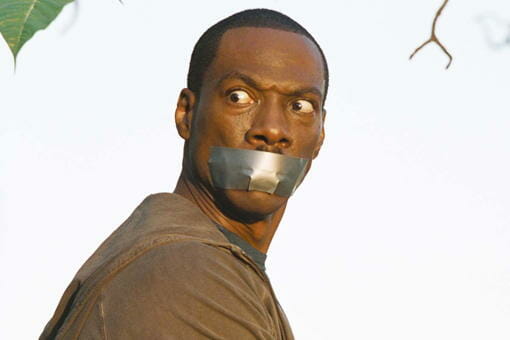By Sunny Choi · March 12, 2012

Not very surprisingly, A Thousand Words tritely champions meaningfully using language to express appreciation and gratitude for your loved ones. It has nothing to offer outside of what’s shown in the trailer. Moreover, its abrupt shift from an inane comedy to a didactical melodrama was very off-putting.
Jack McCall (Eddie Murphy) is a competitive, fast-talking literary agent who always gets what he wants. As the ultimate diva, he even forces his assistant, Aaron (Clark Duke), to pick out all the marshmallows from his cereal and refuses to move to a safer, child-appropriate house for his two-year-old son. Everything goes to hell when he starts pestering Dr. Sinja, a superstar healer-guru (Cliff Curtis), permission to promote his book. Almost as if Mother Nature couldn’t stand for Jack’s lies, a magical tree springs up in his patio. Jack and Sinja soon realize that for every word Jack speaks, the tree loses one leaf. He will die when all the trees lose its leaves.
For the rest of the movie, Jack suffers the consequences of being unable to speak. He loses all his business deals, and his wife (Kerry Washington) misinterprets his silence as apathy towards their marriage. Like in many movies, the main character must reevaluate his self-centered worldview after he or she loses everything. This is nothing we haven’t seen before. The premise of this movie heavily echoes those of Liar Liar and evenThe Christmas Carol–what happens when higher powers finally punish an absolutely selfish man? He must undergo a thorough transformation and become a better husband, father, and son.
Some of the scenes wielded some decent emotional affect. The overall message, that we need to resolve our relationships and appreciate the people in our lives, makes sense albeit lacking originality. However, the sudden shift from inane comedy to melodrama made me wonder if I was watching two different movies that happen to share a setting and cast. This led me to wonder if this movie would have been better suited as a drama with a bit of comedy sprinkled into it. I feel that these topics are more appropriate for dramas like The Family Man. In this way, A Thousand Words is similar to movies like Click that transition from lame jokes to an over-dramatized pity party for the protagonist.
Adding to this list of grievances, I could not empathize with the characters because they are all ridiculous caricatures. For example, I recoiled when Jack stumbles back drunk and tries to commit “verbal suicide.” Jack’s wife is also written as an emotionally unstable woman. She constantly argues with him and either pouts or cries. After she fails to strike meaningful conversation, she tries to seduce Jack as a dominatrix. All of these characters are so ridiculously painful and not at all humorous.
Although the scenes between Jack and his mother, who suffers from Alzheimer’s, were at times sad and heartfelt, they also came off as very heavy-handed. When Jack stands in for his father, she reveals her deepest wish that Jack would forgive his father and let go of his anger. While I understood that interchange, the conversation became blatantly heavy-handed when his mother said, “the most important thing is family, Jack. Family!!!” By forcing these characters to didactically relay these messages, the movie reduces them to caricatures and weakens potentially meaningful dialogue.
The over-looming question also remains–what happens when Eddie Murphy doesn’t talk for much of the movie? The noise level obviously goes down, but so does the overall energy of the movie because unfortunately, all the other characters are even more annoying and unappealing than the protagonist. Also, the movie is such a glaring advertisement for Starbucks that it’s embarrassing. Could they’ve been any more obvious? Obviously, this movie was built to generate profit over having any sort of artistic or social merit. As I can’t see it appealing to any demographic (which is rare), I would advise people to pass on this movie.